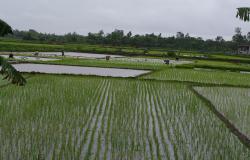
Global collaborations across level, domain, and sector boundaries are on the rise. This article analyses policy entrepreneurship for the establishment of the Global Alliance for Climate‐Smart Agriculture (GACSA), a global multi‐actor collaboration to address climate change and foster food security and development. We explore policy entrepreneurship as a process embedded within specific contexts. To that end we focus on the strategizing process, consisting of conditions, activities, and implications. Through a congruence case study based on interviews, documents, survey, and observation we find that: (1) accommodating a varied global community requires flexibility and adaptability from entrepreneurs towards a dynamic and changing environment; (2) the variety of actors constituting GACSA compromises vigour of the collaboration, and confuses the meaning of CSA; (3) whereas collective entrepreneurship is often depicted as joint operation of multiple actors, it might also be characterized by conflicting activities and/or successive involvement; (4) policy entrepreneurship is useful to establish collaborations, but its role is temporary. Entrepreneurs must therefore be sensitive to their potential obsoleteness and withdraw at the right moment. Our results show that policy entrepreneurship is a useful lens to study global policy processes, while providing guidelines to inspire and support practitioners to engage with global policy processes.
Policy Implications
-
In a period characterized by complexity, policy entrepreneurs must be flexible and adaptive vis‐à‐vis their environment, to anticipate changing contextual circumstances.
-
The umbrella term of climate‐smart agriculture seems attractive to unite a variety of actors, but requires explicit and continuous consideration of contradictory interpretations to address conflicting viewpoints, interests and responsibilities.
-
The promotion of climate‐smart agriculture encompasses multiple and different instances of issue promotion and issue framing, to introduce and sell the concept to different audiences.
-
The role of policy entrepreneurs is often temporary, therefore they must be sensitive to their potential obsoleteness, and know when to withdraw.